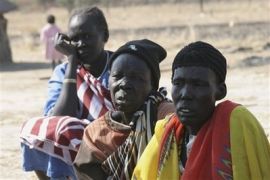Sudan’s joint units need permission to enter court ruled areas – SAF
By Ngor Arol Garang
October 5, 2009 (ABYEI) –The northern army, Sudan Armed Forces (SAF) have strongly warned the Joint Integrated Units (JIU’s) to cease entering the court ruled areas in southern Kordofan without their prior notice.

The two peace partner accepted the ruling and committed themselves to draw the border of the area in September under supervision of international experts.
The January 2005 accord formed separate northern and southern armies and stipulated that joint armed units should be deployed in major towns to keep the peace.
“The joint integrated units should first and foremost give us advance information in a written document giving details of their visit, number of days, and number of visiting personnel and at what capacity,” said SAF Brigade 31 commander stationed at Nyama.
However, the commander who declined to be named further added that they do not have any problem receiving any body so long as they are given advance information so they are able to pass it ahead to their central command.
“We are military who operates and functions under military chain of command,” he stressed.
This comes after the border demarcation technical team was denied security in the areas of operations when SAF ordered immediate withdrawal of the accompanying JIU supposedly deployed to provide adequate security and protection to the team saying not part of their areas of responsibilities.
The team suspended its operation and withdrew from the area to Abyei town following the issuance of military orders on Monday 28 September 2009.
Consultations are being made between the two parties for immediate resumption, said members of the border demarcation technical committee.
The official who did not want to be named also acknowledged departure, for medical reasons of four members from Messeriya group who are members of the local representatives to border demarcation committee.
The committee, besides the official joint delegation and UN experts, includes 18 local representatives 9 from Misseriya and Dinka Ngok.
He also requested the local authorities to extend them unreserved cooperation. “We badly need their assistances through our accompanying members of press; he said adding this was why we first started meeting all concerned authorities including traditional chiefs from both sides.”
Local leaders expressed concern and dismay saying resumption of such restrictive military measures that banning movement indicates signs of reneging on promises made by parties particularly National Congress Party (NCP).
This is not a simple warning. It has a root; said Alor Kuol a retired Sudanese armed forces officer in Abyei. He added that army gets instructions from political leaders, probably from the ruling president.
This issue needs to be immediately addressed by the authorities; he further said stressing that NCP led government should advise SAF to go out of the court ruled areas to allow proper demarcation without military interference in the technical work.
However, a member of the area joint military committee representing SAF, who declined to be named, strongly defended SAF insistencies saying although they are in the court ruled areas, they need an official instruction from SAF headquarters to evacuate.
“You cannot just enter any house even if it is yours without greeting a neighbor,” he stressed adding there need for official communications even if both parties are aware of the business, he said adding that communication first and operations follow.
(ST)
